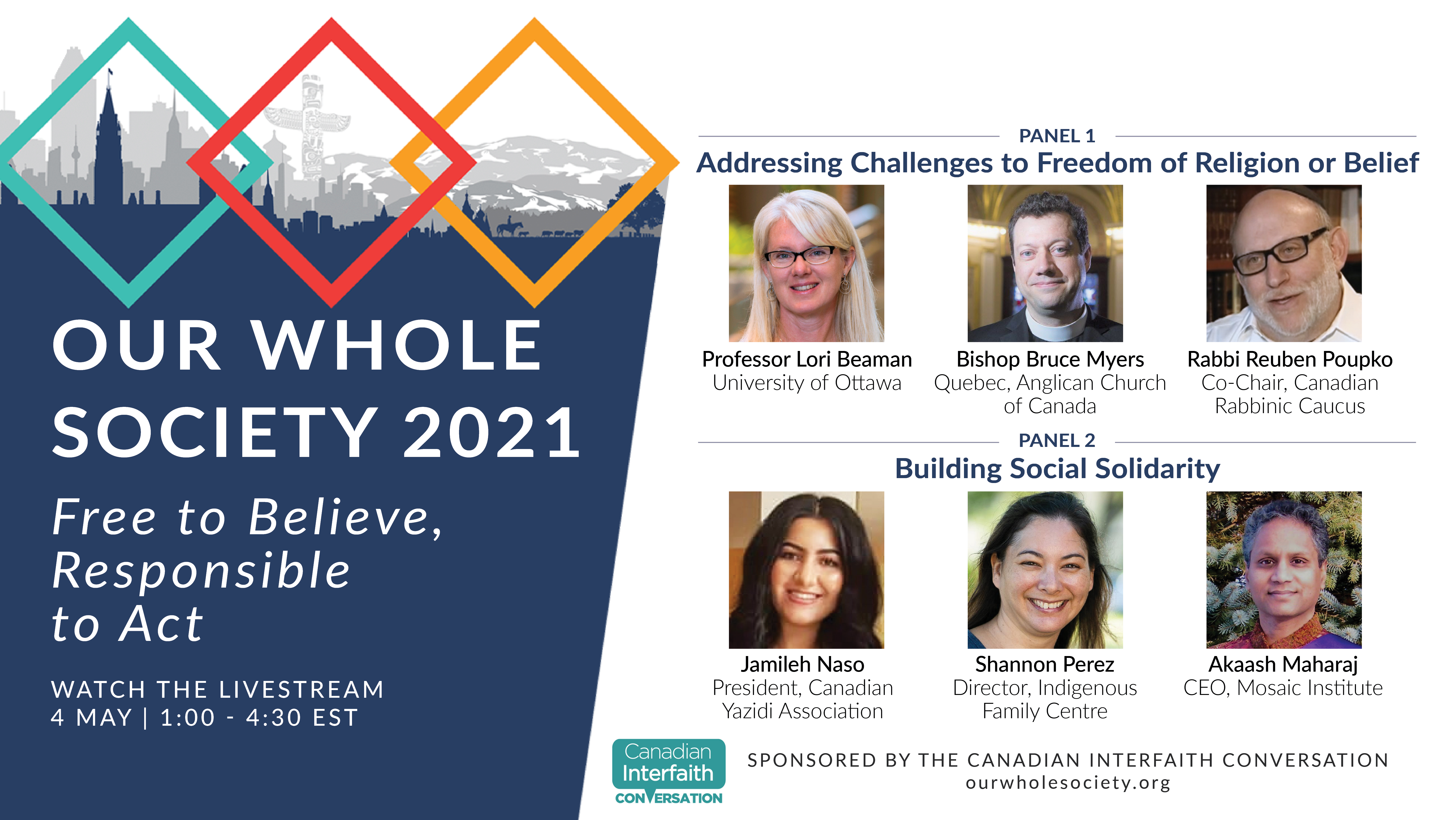“We can emphasize an us versus them approach, or one where we learn from experience to create a … society that allows us to live well together in a complex future.”

Those remarks by Prof. Lori Beaman helped to frame the discussion that took place over the course of Our Whole Society, a conference co-sponsored by the Baha’i Community of Canada in collaboration with the Canadian Interfaith Conversation. Held on May 4 in a virtual format with more than 250 people registered, this was the fifth iteration of a conference that has been held every two years since 2013. The purpose of the conference is to “foster a new dialogue about the changing role of religion in Canadian society.”
The conference has been held in Montreal, Vancouver, Ottawa, and Toronto, engaging hundreds of participants in conversation on how the insights and experience of religion contribute to thinking about the challenges facing Canadian society.
“This year’s conference showed us, once again, the potential for religion to be a constructive and positive force in Canadian society,” said Geoffrey Cameron, chair of the steering committee for the conference and Director of Public Affairs for the Baha’i Community of Canada. “We heard how the ideas, values, and institutions of religion have been an important part of our collective response to COVID, and how religion supports processes of reconciliation, refugee settlement, and building social solidarity.”
The conference opened with a Dakota honour song by Jordan Bighorn, who joined from Winnipeg in Treaty One territory. Bighorn translated the words of the song as, “Great Spirit, help me, I want life, this is my humble prayer.”
The first conference panel examined challenges to freedom of religion or belief, and the speakers focused on the conditions of the coronavirus pandemic. Prof. Beaman noted that religious groups have been deeply implicated in responding to the pandemic, and the vast majority have complied with public health guidelines and promoted public health education among their members. “We have seen how religious groups are not in opposition to science but embrace and attempt to mobilize it, validate, even in the face of the pandemic,” she observed.
Bishop Bruce Myers, Anglican Bishop of Quebec, noted that government restrictions on religious practice in Quebec stimulated new forms of interfaith collaboration. The creation of a new Table interreligieuse de concertation du Québec was prompted by the need for a channel of communication between religious groups and the government.
“After a meeting or two, it became clear that this was a beautiful thing that could be more than an emergency response group and could be a standing body that … is a true “table” where we could get to know each other better,” Bishop Myers reflected.
Rabbi Reuben Poupko, Chair of the Canadian Rabbinic Caucus, added: “Faith groups need to say more clearly the role they play in society. More and more people are dependent on their faith communities. We need to assert that with greater confidence and greater hope and joy.”
The second theme of the conference addressed the issue of social solidarity, and – recognizing the role played by the coronavirus in exacerbating pre-existing divisions and inequalities – asked how religion can play a role in healing the body politic.
Shannon Perez, Co-Director of the Indigenous Family Centre, reflected on the importance of recognizing our interdependence with one another: “When building community and social solidarity,” she said “there is that aspect of symbiosis and reciprocity. When we look at building community, we should see our community as the image of God, and live our life in that way.”
The discussion of solidarity emphasized the importance of challenging prejudices and ignorance about others, to build bonds of fellowship and love. Akaash Maharaj, CEO of the Mosaic Institute, emphasized the critical perspective offered by religion. Many challenges will not be solved within a particular lifetime but require generations of people to work for their resolution. “Faith communities have the ability to frame conversation on these issues as something that extends beyond our life,” he said.
Jordan Bighorn closed the conference by chanting a prayer of The Báb, which expresses the hope that the seed of faith “may grow to become a mighty tree, beneath the shadow of which all the peoples and kindreds of the earth may gather.”
Throughout the conference, speakers and participants observed that the search for solutions to the challenges confronting society require the perspective offered by religion. Dr. Cameron noted in his opening remarks that that there are many forces dividing us, and one of the tasks of religion is to unite. “Religion gives us a perspective of reality that combines the material and the spiritual, it helps us to view society as one interdependent whole, and allows us the grace and patience to disagree with one another and strive to attain a better mutual understanding.”

